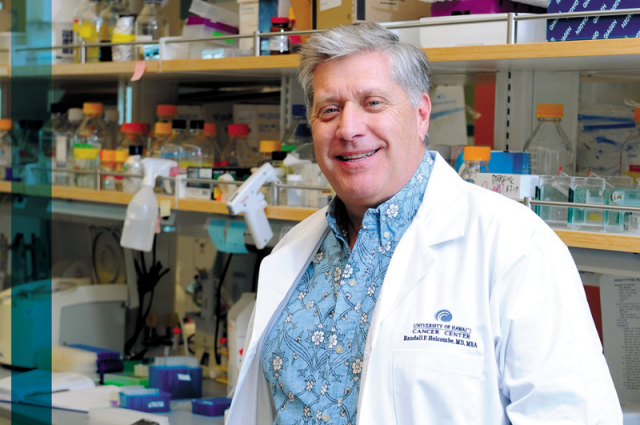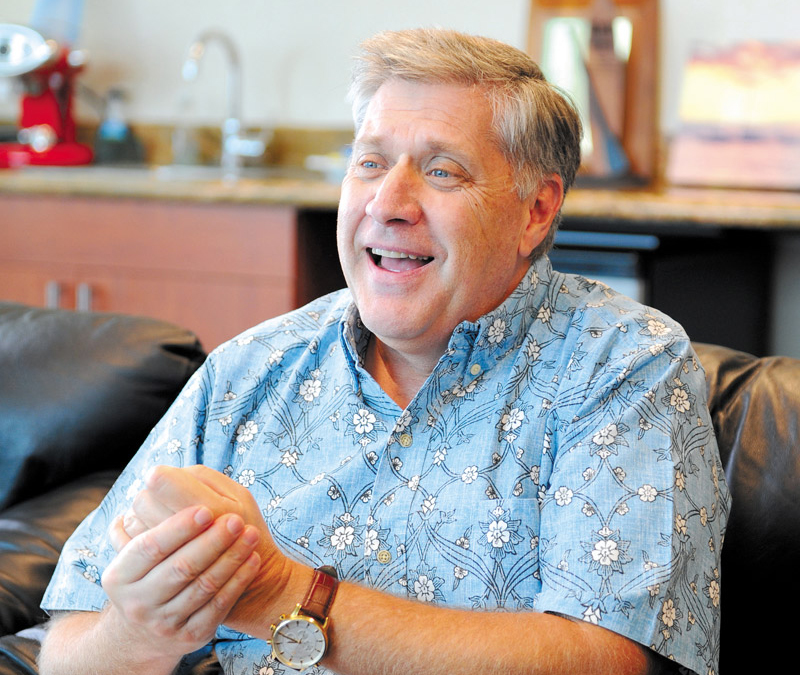
Written by: Susan Kang Sunderland, Midweek, December 5, 2017 @ 3:18pm
Article: http://www.midweek.com/dr-cancer-research/
One year after taking over as director of University of Hawai‘i Cancer Center, Dr. Randall Holcombe remains committed to finding cures and developing new methods of prevention in the ongoing fight against cancer.
Class will come to order. Today’s lesson is on one of the most fascinating subjects in medical science. It has been studied for centuries, is being addressed in many ways, and yet challenges experts because of its complexity. This knotty life force is called cancer.
Most people have a single focus on the subject — find a cure. The sarcastic sneers, “We send men to the moon, why can’t we find a cure?” The cynic jeers, “The money is not in the cure, it’s in the treatment.”

Geez, tough audience.
Part of the challenge in curing cancer — abnormal cells in organs or tissues — is that it isn’t one disease, but more than 100 different diseases. Addressing detection and treatment requires a lot of research that takes time and money.
But scientists are making great strides, including in our own backyard. The 20th century saw the greatest progress in identifying cancer carcinogens, chemotherapy, radiation therapy and better means of diagnosis.
Research related to ethnic diversity and Pacific populations are hallmarks of excellence at University of Hawai‘i Cancer Center in Kaka‘ako. Scientific discovery and having one of the world’s largest genetic databases is making a big impact in the way cancer is diagnosed and treated in the Pacific.
For 45 years, the cancer center has contributed to the health of islanders by providing research and access to clinical trials, which offer innovative life-saving treatments that would not otherwise be available here.
It is a facet of Hawai‘i’s reputation in global wellness that is often overlooked and undervalued. Hawai‘i residents themselves — cancer patients and health care stakeholders — contribute substantially to groundbreaking progress.
This academic medicine and community partnership is a unique aspect of UHCC’s program. It supports its mission of reducing the burden of cancer through research, education, patient care and community outreach.
KEYS TO CURE
Research studies and clinical trials are keys to finding cancer cures and definitive methods of prevention. For that reason, we sought an update from UHCC’s director and asked him to demystify clinical trials. Our inquiry is timely, as UHCC launches a public education campaign on clinical trials.
No one is more passionate about the subject than Dr. Randall Holcombe, director of University of Hawai‘i Cancer Center. After a year on the job and calming down some management turmoil that existed before, he says, “Things are going in the right direction and have even exceeded my expectations.”
In his first year, UHCC’s budget has been stabilized, research grants are at an all-time high, and the outlook is as sunny as the gleaming six-story building it occupies behind John A. Burns School of Medicine in Kaka‘ako.
Holcombe has more than 25 years in academic medicine. Before moving to Hawai‘i with wife Connie, he was chief medical officer for cancer at Mount Sinai Health System in New York. He also served as deputy director of Tisch Cancer Institute and director of ambulatory oncology services at Mount Sinai Hospital.
Before that, he was division chief of hematology/oncology for 13 years at University of California-Irvine, where he also served as associate vice chancellor for research, director of the office of clinical research and trials, and associate director of Chao Family Comprehensive Cancer Center.
He graduated from Duke University and New Jersey Medical School. He received post-doctoral research training at Harvard Medical School department of genetics and Howard Hughes Medical Institute.
LAMP OF ENLIGHTENMENT
Holcombe can speak on a range of topics, but it is his keen knowledge of clinical trials that we tap into today. Clinical trials are research studies that involve people.
“We are unique among NCI cancer centers,” says Holcombe, referring to UHCC being one of only 69 centers designated by the National Cancer Institute for competitive cancer research grants.
This year, UHCC applied for grants totaling $175 million and has been awarded $36 million, with the remainder still pending decisions, he reported recently.
“Hawai‘i has a lot of unique attributes, including its ethnic diversity, not duplicated by any other NCI-designated centers.” he says.
UHCC provides the clinical trials infrastructure for two-thirds of cancer patients in the state, with oversight trials at The Queen’s Health Systems, Hawai‘i Pacific Health hospitals, Kuakini Health System and many private practices on O‘ahu.
It coordinates about 150 active national trials and is currently monitoring about 1,000 patients, while enrolling about 320 clinical trial patients annually. Over the past five years, 12,140 patients enrolled in local trials.
UHCC specifically focuses on trials relevant to Native Hawaiians and other ethnic groups with cancer health disparities.
“We have a review committee that looks at all aspects of the trials to make sure patients benefit from the oversight and monitoring,” he says. “Treatments improve with each clinical trial.”
There are many kinds of trials that test new ways to treat, diagnose and prevent cancer, as well as manage symptoms and side effects. Trials are available for all stages of cancer, not, as many assume, just for people with advanced stages not responding to treatment.
FEAR, FUSS, FAZE
Psychological, cultural and mythical barriers about trials still exists, but informed patients and their support network are paths to advancement. Today’s clinical trials are said to be tomorrow’s standard of care.
Cancer Research Institute notes that care is shifting away from “rough tools” such as surgery, chemotherapy and radiation therapy. The use of immunotherapy is considered a new frontier to manipulate immune systems to combat cancer cells.
U.S. Sen. Mazie Hirono, for example, is undergoing immunotherapy in a thyroid gland as part of her fight against stage 4 kidney cancer.
“We have several researchers working in the area of cancer immunology and several clinical trials that utilize some of the new immunotherapy medications,” Holcombe says. “This is an exciting area we’d like to expand and grow. Our plans include recruitment of new faculty specifically focused in this area and expanding the menu of trials with immune system stimulating drugs.”
Yet, Holcombe adds, the number of adult cancer patients in clinical trails in the U.S. is only about 2-3 percent. Additionally, many patients are not treated at an academic center; they’re treated in the community.
“All of the oncology organizations — American Society of Clinical Oncology, American Cancer Society, National Cancer Cooperative Group, among them — state that clinical trials are the best quality care that patients can receive,” he says. “Trials are evidence-based, reviewed by experts, offer standardized treatments as well as novel treatments that might not be otherwise offered.”
David Nanod, a cancer clinical trial patient, remarks, “I was hoping for the best treatment, so I decided to participate. I probably would not have done it if it was anywhere else besides Hawai‘i. The logistics are too drastic to go all the way to the Mainland for treatment.”
“Kudos to those physicians who put patients on clinical trials because that extra effort helps medical science,” heralds Holcombe.
20 BY 2025
“We have a lot of good cancer treatments today because of clinical trials done 10 years ago,” he points out. “This takes time and education, and it’s not right for every circumstance. But participation should be higher than 2-3 percent.”
For that reason, UHCC is embarking on a proactive public information campaign entitled “20 by 2025.”
The goal is to get 20 percent of more than 6,000 people diagnosed with cancer in Hawai‘i every year enrolled in clinical trials by 2025.
Trials admittedly are long, involved processes that can deter well-meaning volunteers. But they are hope for the future, experts contend. People today are living longer lives from successful cancer treatments. Clinical trials are the key to making progress against cancer.
One can only hope it is never the case that, as one observer puts it, “The consumer is really underutilized in health care.”
Class dismissed.
QUESTIONS TO ASK ABOUT CLINICAL TRIALS
• Why is the trial being done?
• Why do the doctors who designed the trial believe that the treatment may be better than the standard treatment? Why may it not be better?
• How long will I be in the trial?
• What kinds of tests and treatments are involved?
• What are possible side effects or risks?
• What are possible benefits?
• How will we know if the treatment is working?
• Will I have to pay for the treatments or tests?
• What costs will my health insurance cover?
• How could the trial affct my daily life?
• How often will I have to come to the hospital or clinic?
• Will I have to travel long distances to take part?
• What are other treatment choices, including standard treatments?
• How does the trial treatment compare with the other choices?
Source: National Cancer Institute